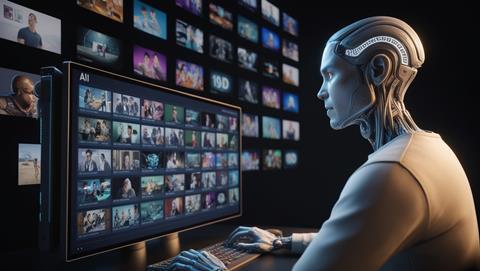Jose Puga, CEO of Imaginario, gives his advice on working with AI service providers

AI is transforming entire industries at an astonishing pace, especially the media and sport sectors. In the sport sector alone, AI’s value is expected to soar to $19.2 billion by 2030, according to Allied Market Research.
One of the main contributors to these technological advances is the availability of extensive datasets for model training. Coincidentally, sport and media organisations possess a large portion of this valuable multimodal training data (e.g., statistics, videos, images, metadata, narrations, interviews, and more).
The relevance of high-quality data has sparked significant debates about the scraping and allegedly illegal use of third-party intellectual property (IP) by tech giants and unicorn AI startups. However, senior leaders in the media and sport industries face an existential dilemma: how to engage with AI providers in a way that doesn’t jeopardise their business interests in the mid to long term while also taking advantage of this once-in-a-lifetime opportunity to boost productivity and unlock new revenue streams.
Over the past three years at Imaginario AI, we have been tackling both commercial and legal complexities in tandem with clients such as NBCUniversal, Warner Bros. Discovery, and other media powerhouses. Here, I share perspectives and insights on how we have approached these partnerships alongside our shared concerns about the industry’s future direction.
Equal-term partnerships with specialist AI providers
Partnering with AI specialists you trust and can manage on equal terms is essential for the responsible implementation and customisation of AI in sports and media. For instance, FIBA (International Basketball Federation) has teamed up with Genius Sports (not the likes of OpenAI or Microsoft) to automate live data collection, automated broadcast capabilities, and optical player tracking for more than 200 leagues and federations worldwide.
Partnering with vendors specialized in AI and media, even small boutique companies, gives clients the opportunity to customise service agreements and AI technologies, address potential copyright issues upfront, and minimise the risk of future legal disputes related to AI-generated content.
Enhancing data transparency and model explainability
Ensuring clear and transparent data practices is becoming increasingly critical, especially for sport organisations that rely on vast amounts of historical and real-time data. This involves providing detailed information on data sourcing, cleaning, annotation, storing, and updating processes. Explainability in AI models is essential for fostering trust, as it helps stakeholders understand the decision-making processes.
By offering documentation of the datasets used in training, companies can enhance the perceived reliability and fairness of their models. This transparency ensures that AI-driven insights, such as performance predictions, athlete tracking data, and strategic recommendations, remain private and trustworthy for coaches, athletes, analysts, and broadcasters.
Licensing agreements and using AI tools to speed-up curation processes
Licensing agreements are emerging as a key mechanism to ensure fair compensation for rights owners whose data is used in AI training. For example, OpenAI has recently closed multi-million-dollar licensing deals with organizations like Associated Press, Reddit, NewsCorp, and Axel Springer SE. These agreements allow access to valuable data while ensuring that original creators and rights holders are compensated appropriately.
Sport organisations can benefit from similar agreements by licensing their extensive video archives to AI companies. With the global sport licensing market approaching the $60 billion mark this year, according to Sport Business, there’s an untapped opportunity to clean, organise, and license clips and highlights to other third parties using AI-powered search, discovery, and cost-efficient label-less solutions.
Despite the clear economic benefits of licensing legacy archives, we recommend a cautious approach. While you might receive millions of dollars today from companies like OpenAI, you could lose revenue later if you’re not clear and strategic about how your datasets will be used. This is especially sensitive with generative AI, as these models could generate and mimic your content in the future, eating into your market share and differentiation. However, licensing is a valid tactic that is not only commercially attractive but also ensures that the data used to create new AI-driven products respects intellectual property rights.
Establishing Guardrails and Controls
To mitigate the risks associated with AI-generated content, companies are introducing stringent guardrails and control measures. For example, if you input a controversial prompt or one that involves protected IP into ChatGPT or Claude, you’ll notice their detection controls are more stringent than when these models were launched in 2023.
Leading stock footage providers and Adobe have also implemented safeguards across various apps to prevent the creation of sensitive deepfakes and new generative content from unlicensed content, ensuring that AI-generated images do not feature identifiable individuals or brands without authorisation. These measures are crucial for maintaining the credibility and reliability of AI technologies.
For sport organisations, implementing similar controls can prevent the misuse of AI to create misleading or harmful content, such as fake match outcomes or unauthorised uses of player likenesses. This helps protect the integrity of the sport and the reputations of athletes and brands.
Customising AI models with proprietary data
Some organizations are choosing not to use prominent foundational AI models in favor of training specialist third-party models using their own data in secure cloud environments such as AWS, GCP, or Azure, or, in some instances, on-premises.
This strategy can reduce the risk of IP violations and ensure compliance with legal standards. By fine-tuning AI models to specific client requirements, companies can achieve more precise and relevant results. However, this route can take years and cost millions of dollars, depending on how much of your tech stack and processes you want to keep in-house.
For sport organisations, developing custom AI models, including in partnership with AI companies, can lead to highly customized solutions, such as personalized fan experiences, automated media management, and optimized game strategies. This approach not only improves performance but also provides unique insights that could give teams and leagues a competitive edge.
Conclusion
Adopting AI technology involves navigating complex challenges and opportunities, especially for sport organisations, Hollywood Studios and broadcasters with vast archives of valuable content. By partnering with boutique organizations in the media and AI space, enhancing data transparency, establishing licensing agreements, implementing control measures, and developing proprietary models, or a combination of these approaches, the media and sports industries can effectively balance innovation with legal and strategic considerations.

Jose Puga is CEO of Imaginario







No comments yet